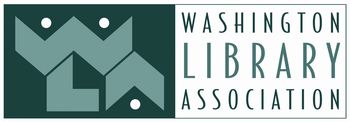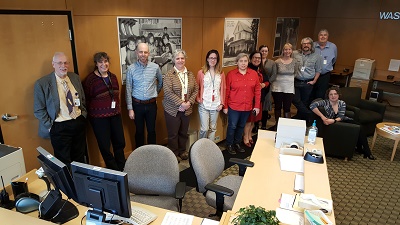- Home
- About
- Join
- Groups
- Divisions
- Sections
- Section Chair Roster
- CAYAS (Children & Young Adult Services)
- CLAWS (College Libraries Across Washington State)
- IFS (Intellectual Freedom Section)
- LISS (Library and Information Student Section)
- SAIL (Serving Adults in Libraries)
- SRRT (Social Responsibilities Round Table)
- WALE (Washington Library Employees)
- WALT (Washington Library Trainers)
- WLFFTA (Washington Library Friends, Foundations, Trustees & Advocates)
- Committees
- Advocacy Committee
- Alki Editorial Committee
- Conference Committee
- Finance Committee
- Grants and Partnerships
- Legislative Committee
- Marketing Committee
- Member Services Committee
- Professional Development Committee
- OTTER Book Award Committee
- Sasquatch Book Award Committee
- Towner Book Award Committee
- WCCPBA Committee
- Advocacy
- Resources
- Conferences & Events
- Awards & Scholarships
- Store
I AM WLAMarch 29, 2017 The Washington State Library
Who are you and what does your organization do?Washington State Library, a division of the State of Washington, Office of the Secretary of State. Like all libraries, WSL provides services to our constituents. Our Central Library provides research services to those seeking information about Washington and the Pacific Northwest. From the territorial collection which was shipped from New York around the horn of South America arriving in Olympia in 1853, to the largest and most complete collection of Washington newspapers, to online access to digitized historic books, maps, photographs, and newspapers, these are a few of the strengths in our collection. We support those who need access to state and federal publications. We are re-introducing support for the legislature. Our Institutional Libraries serve those who are incarcerated in nine prisons and the residents of the state’s two mental hospitals. These libraries not only provide typical public library services to those populations but also provide materials to support the re-entry into society. The State Library also has a number of Olympia area branches and affiliates which serve state agency employees. Library Development serves all types of libraries and their staff within Washington through the implementation of statewide projects such as the Ask WA virtual reference service to management of the Washington Anytime Library Overdrive consortium along with One Click Digital consortium, to Statewide Database Licensing which provides the ProQuest database package to the vast majority of libraries in Washington. We also provide consulting, grants, subsidies, and training. The Washington Talking Book & Braille Library (WTBBL) located in Seattle provides library service to those who are unable to read standard print materials due to blindness, visual impairment, deaf-blindness, physical disability (cannot hold a book or turn pages), or reading disability. Services are provided state-wide, either at the library or by mail. WTBBL has been part of the National Library Service for the Blind and Physically Handicapped (NLS) of the Library of Congress since 1931. In addition to the services derived from the NLS, WTBBL produces local books in either audiobook or braille format. For their constituency, WTBBL provides standard library services that include reference service, reading lists, youth services, and training and instruction. They also work with local libraries throughout the state to further support the needs of their constituency. Currently, what is the most important work that your organization is doing to serve your communities?Of course all of our work is important, but the State Library has a unique contribution to the state in its services to those who are incarcerated, hospitalized and who cannot read standard print. We have reinstated our service to the Legislature, the main purpose for which the library was established over 100 years ago. Approximately how long have you been a WLA institutional member?In point of fact, the State Library was behind the founding of WLA, so I guess we are the original institutional member! What is your most memorable WLA experience or collaboration?Perhaps it was when State Librarian Jesse Hitt called together librarians from around the state in March 1905 to form a statewide library association called WLA. Not sure if WLA has been in continuous existence since then or disbanded and reformed, perhaps others know. In recent history, it has to be attendance at WALE in October 2014 and the breakfast keynote by Secretary of State Kim Wyman. She freely admitted she didn’t know much about libraries (or WSL) when she was elected but that day her passion was very evident as she talked about the library community and the value of all libraries to the State. On a lighter note, it very well could be the WLA Conference in Pasco in April 1999 although perhaps some of us are dating ourselves. Remember Sherman Alexie flying in at the last moment with no sleep. I don’t think there was a dry eye at the banquet that night whether it be from laughing or shedding a few tears. He recounted his days growing up on the reservation. The library was his sanctuary. His story at times had librarians rolling in the aisles as his anecdotes were splendid and then moments later close to tears hearing about the conditions growing up. Who do you think was the new incoming WLA president at that 1999 conference? Perhaps you know her now as Cindy Aden, our Washington State Librarian. Joan Weber stepped down as WLA president at this conference. In what ways has your organization gotten involved with WLA or taken advantage of its benefits?Over time many staff at the Washington State Library (WSL) have served in various roles, from serving on conference committees to being a member of WALT, to serving on the Board. Library Development and other WSL staff attend the conferences in order to share our knowledge, let others know about the services we provide to the Washington library community through exhibiting and presentations, and as time permits, attending all the great sessions where we also learn and develop as library staff. State Librarian Cindy Aden (then Cunningham) served various roles starting in 1990, which culminated in her vice presidency and presidency in 1998-2002. What would you tell other organizations about being a WLA member?The Washington Library Association is a great way to meet your peers from around the state, network with others from different types of libraries and in different positions, and to renew your spirit and the passion for your work. It is also a valuable leadership experience and allows you to expand your career and professional network beyond the walls of your job in the library. If someone were writing your organization’s biography, what would the title be?I think a couple of people did: “Dynamics of Change” by Maryan E. Reynolds, WSU Press, 2001; “Out of the Frying Pan: Structural and Cultural Change at the Washington State Library” by Christine S. Granquist, UNC at Chapel Hill, April 2005. If you know us, you likely know of the ups and downs over time at the Washington State Library. From the highs of piloting projects which resulted in the formation of several library districts, to creating WLN in conjunction with the library community, to development of the Statewide Database Licensing project, to the Microsoft IT Academy (now Imagine Academy) that many libraries participate in across Washington. And the lows from decades of flat funding while the cost of everything else increased, to the proposal to eliminate the State Library in early 2000, to significant staff layoffs and budget reductions in the mid-to-late 2000s. Did I mention being absorbed into the Office of Secretary of State as one of the highs? Sam Reed and now Kim Wyman are great champions for WSL and all libraries throughout the State of Washington. |

